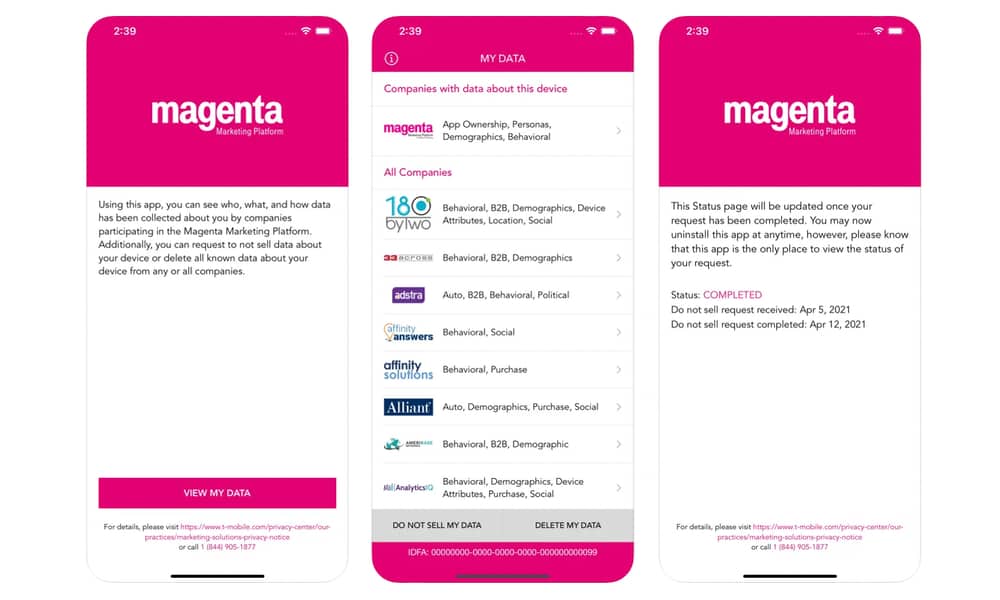The iPhone Is Safe from T-Mobile’s New Ad Tracking — For Now | How to Opt Out
 Credit: Mateus Maia / Unsplash
Credit: Mateus Maia / Unsplash
Toggle Dark Mode
Sadly, it looks like T-Mobile has just officially gotten into the game of tracking and selling information on its mobile customers — in this case, the apps you use and how much time you spend using them.
The program is called App Insights and is not entirely new. T-Mobile began rolling it out as a beta last spring, automatically opting customers into the new tracking program. The only thing that’s changed now is that the company has removed the “beta” tag and declared it fully operational.
To be clear, T-Mobile isn’t alone in this kind of data collection; it’s just coming late to the party. AT&T and Verizon have been doing this for years, and naturally, they tout this as a “good” thing, promising that the data you give them will help the carriers do wonderful things for you and the world around you.
There’s some truth in that, of course, but they’re also brazenly selling this data to advertisers. Perhaps that extra profit translates into lower bills for customers, but the carriers aren’t talking about that.
As creepy as this sounds, it’s worth noting that all the carriers anonymize the customer data — in theory, at least.
T-Mobile doesn’t care what apps an individual person is using; they want to know what “people” are doing as a whole.
These are the metrics advertisers care about, and these days it’s all about apps — T-Mobile is even marketing this to advertisers with the tagline “Apps Speak Louder than Words,” describing the apps people use as “the strongest indicator of consumer intent.”
Fortunately, there is a way to opt out, but the good news is that if you’re an iPhone user, you don’t really need to. As usual, Apple has your back when it comes to privacy.
According to James Hercher at Ad Exchanger, T-Mobile isn’t even trying to collect data on iOS devices — probably because it knows it’s not going to get anything useful, thanks to Apple’s strong privacy protections.
T-Mobile also draws the line at data collection on Apple’s iOS. No iOS data, including opted-in IDFAs, is available in App Insights and T-Mobile doesn’t target any Apple users via its DSP. James Hercher, Ad Exchanger
Hercher also notes that T-Mobile isn’t delivering targeted ads to iPhone users via its demand-side platform (DSP). After all, there’s not much point in trying to deliver targeted ads to an audience that you’re not getting any helpful information with which to target those ads.
Mike Peralta, who heads up the T-Mobile’s ad revenue group, told Ad Exchanger that the carrier is “kicking the tires” on trying to figure out how to make iOS work with its App Insights product and overall ad business.
However, T-Mobile’s head of advertising products and development, Jess Zhu, added that data from iOS audiences will “have a lower fidelity” due to Apple’s App Tracking Transparency, which effectively eliminates the ubiquitous IDs that can track users across apps. While it’s still possible for T-Mobile to find out which apps are being used by its iPhone customers, it has no way of linking those up to individual user profiles.
T-Mobile is also reportedly taking a very cautious approach to this in general, “tiptoeing around mobile data” as Hercher puts it. For example, it’s ignoring location data because that has a much higher privacy cost — as researchers have proven, there’s no way to reliably anonymize location data — especially the critical mass of such data that a mobile carrier would be able to collect. The carrier would also prefer to avoid the ire of Apple.
T-Mobile is missing out on a revenue opportunity, but it’s not worth the risk of getting on Apple’s bad side.James Hercher, Ad Exchanger
At this point, Zhu explained that data from T-Mobile’s iPhone subscribers is being used as a benchmark against Android users, where the carrier can collect much more useful information. For instance, while T-Mobile has no way of knowing which iPhone users are using which apps, the fact that certain apps are popular on iPhones, in general, can be a useful data point. Zhu says that “Apple customers generally have higher purchase power, but their behaviors and interests may not be actually significantly different from their Android peers.”
How to Opt Out of T-Mobile’s App Insights Program
While there doesn’t seem to be a need for iPhone users to opt out of T-Mobile’s new program (yet), you may want to do so on principle alone. Here’s how:
- Download T-Mobile’s Magenta Mktg Program Choices app from the App Store.
- Open the app, and tap the View My Data button. This will also show you which companies have data about your device.
- Tap Do Not Sell My Data at the bottom to opt out of all tracking.
- You may also want to tap Delete My Data to remove any data that the carrier already has stored about your device.
If you live in California, you can also go through the App Choices platform if you’d prefer to avoid installing a T-Mobile app just to opt out of T-Mobile’s tracking.









